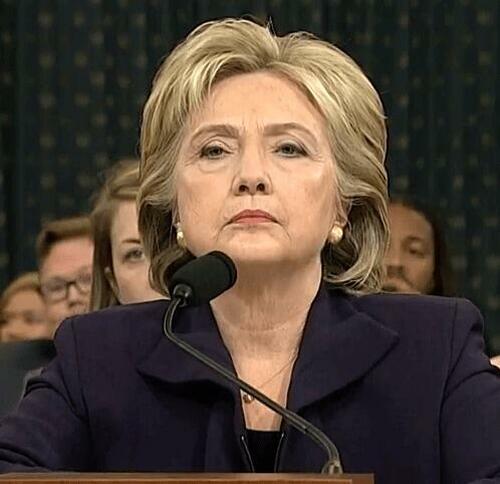
Below is my column in The Hill on the latest calls to protect democracy with distinctly undemocratic measures. Former presidential candidate Hillary Clinton insisted that the 2024 election was our D-Day, suggesting that voters would have to fight the GOP like the Nazis in World War II. Clinton previously called on Europe to censor American citizens when Twitter sought to dismantle its censorship program and called her defeat in the 2016 election “illegitimate.” Yet, for civil libertarians, the “defenders of democracy” are the very threat to democracy going into the 2024 election.
Here is the column:
In 2024, the greatest test for our Constitution may be whether it can survive the “Defenders of Democracy.”
Ronald Reagan often said, “The nine most terrifying words in the English language are: I’m from the government and I’m here to help.” Today, Reagan’s line cannot compare with the line that sends many of us into a fetal position: “I’m a Democrat and I am here to save democracy.”
The jump scare claim is that unless citizens vote for democrats, the end of democracy will begin shortly. In 2022, House Majority Whip Rep. James Clyburn (D-S.C.) told “Fox News Sunday” that “democracy will be ending” if Democrats lost the midterms.
The rhetoric has continued to ramp up with the upcoming election.
From President Joe Biden to a host of progressive politicians and pundits, the 2024 election is all about saving democracy. The public has been told that if the Democrats lose power, citizens will be living in a tyrannical hellscape. Vice President Kamala Harris stated in one interview that 2024 “genuinely could be” the last democratic election in America’s history. Dozens of Democrats have said that democracy will end if Biden is not reelected.
The Washington Post even ran an op-ed titled, “A Trump dictatorship is increasingly inevitable. We should stop pretending.”
Many Americans have tuned out the overheated rhetoric, as shown by Donald Trump’s continuing lead in many polls even after his conviction in Manhattan. The warnings also ignore that our system has checks and balances that protected democracy for centuries as the world’s oldest and most successful constitutional system. These dire predictions would require all three branches to fail in an unprecedented fashion.
While these figures cite the Capitol riot on Jan 6., 2021 as evidence of the pending collapse of democracy, the system worked as designed on that day. Congress refused to be deterred by the riot and virtually every court (including many presided over by Trump-appointed judges) rejected challenges to the election.
The most obvious threats today to the democratic system are coming from the left, not the right.
Democratic secretaries of state sought to block Trump from the ballot in 2024, and Democratic members sought to bar roughly 120 colleagues from their respective ballots. It seemed that the greatest threat to democracy was its exercise by voters. Fortunately, a unanimous Supreme Court rejected the theory and added, “Nothing in the Constitution requires that we endure such chaos.”
There has also been a push by Democrats to keep third-party candidates off ballots. Again, the last thing democracy needs is for voters to have more democratic choice.
In New York, Democratic congressional candidate Paula Collins even suggested that, after the election, the focus must be on “re-education” of MAGA voters, although she acknowledged that “that sounds like a rather, a re-education camp. I don’t think we really want to call it that. I’m sure we can find another way to phrase it.”
Democratic operatives are using the same rationalization to call for biased reporting to help Biden get reelected.
Democratic strategist James Carville this week demanded more “slanted” media coverage against Donald Trump to save democracy. Carville was triggered by New York Times editor Joe Kahn suggesting that the newspaper report the news in a fair and neutral manner. The suggestion sent many pundits into vapors at the very thought of reembracing objectivity in journalism.
“I don’t have anything against slanted coverage,” Carville insisted. “I really don’t, I would have something against it at most other times in American history, but not right now. F— your objectivity. The real objectivity in this country right now is we’re either going to have a Constitution or we’re not.”
It was particularly galling to hear the call for “slanted coverage” in the same week that the Hunter Biden laptop was authenticated and used as evidence in his Delaware trial. The government has called the widely reported claim that the laptop was “Russian disinformation” a debunked “conspiracy theory.” Carville was making his pitch for more biased reporting to the very media that buried the laptop story before the last election and spent two years in denial of its authenticity.
Yet, many journalists agree with Carville. Some journalism schools have been teaching that reporters need to dump concepts of objectivity and neutrality to achieve political and social reforms.
This week, reporters were irate after Washington Post publisher and CEO William Lewis issued a blunt message that the newspaper could not survive after losing half of its readership and tens of millions of dollars last year. He told the staff: “People are not reading your stuff. Right. I can’t sugarcoat it anymore.”
The fear that these newspapers might cover Biden and Trump in a fair and balanced way was immediately denounced as . . . wait for it . . . a threat to democracy. After Carville’s meltdown, the Washington Post’s Margaret Sullivan warned Kahn and others that “our very democracy is on the brink, and how the Times covers that existential threat is of extraordinary importance.” She then asked whether the paper will “forthrightly identify the problems posed by a radicalized Republican Party that is increasingly dedicated to lies, bad-faith attacks and the destruction of democratic norms.”
Sullivan expressed alarm that the media would “try to cut the situation straight down the middle as if we were still in the old days — an era that no longer exists?”
The “era” appears to be the golden age of journalism when most Americans respected and patronized the same media outlets. Now, citizens are fleeing mainstream media, and polls indicate that they view reporters as pursuing the very political agendas embraced by figures like Carville and Sullivan.
Many voters are also responding to what they see as the politicalization of the criminal justice system, particularly with Trump’s recent trial in Manhattan. Again, these cases are being embraced as key to “defending democracy” when many citizens view them as the very antithesis of a nation committed to the rule of law.
This glaring disconnect was evident when President Joe Biden spoke on the top of the Point-du-Hoc in Normandy on the 80th anniversary of D-Day. Biden again used the event to suggest that democracy was in danger in the United States with the upcoming election. Yet, Biden has overseen widespread government censorship with federal agencies targeting those with opposing views on everything from elections and climate change to COVID-19 and transgender policies.
As Democratic secretaries of state sought to bar Trump from ballots, Biden refused to oppose the efforts. When liberal law professors and members demanded to pack the Supreme Court to guarantee a liberal majority, Biden refused to denounce it during the last campaign.
This is why some in the country may view Biden and the Democrats as existential threats not just to democracy, but to themselves. They see a party that is engaged in efforts to cleanse ballots (of Republicans), censor dissenting voices and prosecute political opponents. That is not exactly what propelled those men to climb the cliff of Pointe-du-Hoc in 1944.
Fortunately, our democracy does not depend on any president. It was designed by James Madison to withstand the worst, not the best, motivations of our leaders. After all, Madison wrote in Federalist #51, “If Men were angels, no government would be necessary.”
The system that he designed has withstood political, economic and social crises, including a civil war. It may even protect us from today’s “defenders of democracy.”
Below is my column in The Hill on the latest calls to protect democracy with distinctly undemocratic measures. Former presidential candidate Hillary Clinton insisted that the 2024 election was our D-Day, suggesting that voters would have to fight the GOP like the Nazis in World War II. Clinton previously called on Europe to censor American citizens when Twitter sought to dismantle its censorship program and called her defeat in the 2016 election “illegitimate.” Yet, for civil libertarians, the “defenders of democracy” are the very threat to democracy going into the 2024 election.
Here is the column:
In 2024, the greatest test for our Constitution may be whether it can survive the “Defenders of Democracy.”
Ronald Reagan often said, “The nine most terrifying words in the English language are: I’m from the government and I’m here to help.” Today, Reagan’s line cannot compare with the line that sends many of us into a fetal position: “I’m a Democrat and I am here to save democracy.”
The jump scare claim is that unless citizens vote for democrats, the end of democracy will begin shortly. In 2022, House Majority Whip Rep. James Clyburn (D-S.C.) told “Fox News Sunday” that “democracy will be ending” if Democrats lost the midterms.
The rhetoric has continued to ramp up with the upcoming election.
From President Joe Biden to a host of progressive politicians and pundits, the 2024 election is all about saving democracy. The public has been told that if the Democrats lose power, citizens will be living in a tyrannical hellscape. Vice President Kamala Harris stated in one interview that 2024 “genuinely could be” the last democratic election in America’s history. Dozens of Democrats have said that democracy will end if Biden is not reelected.
The Washington Post even ran an op-ed titled, “A Trump dictatorship is increasingly inevitable. We should stop pretending.”
Many Americans have tuned out the overheated rhetoric, as shown by Donald Trump’s continuing lead in many polls even after his conviction in Manhattan. The warnings also ignore that our system has checks and balances that protected democracy for centuries as the world’s oldest and most successful constitutional system. These dire predictions would require all three branches to fail in an unprecedented fashion.
While these figures cite the Capitol riot on Jan 6., 2021 as evidence of the pending collapse of democracy, the system worked as designed on that day. Congress refused to be deterred by the riot and virtually every court (including many presided over by Trump-appointed judges) rejected challenges to the election.
The most obvious threats today to the democratic system are coming from the left, not the right.
Democratic secretaries of state sought to block Trump from the ballot in 2024, and Democratic members sought to bar roughly 120 colleagues from their respective ballots. It seemed that the greatest threat to democracy was its exercise by voters. Fortunately, a unanimous Supreme Court rejected the theory and added, “Nothing in the Constitution requires that we endure such chaos.”
There has also been a push by Democrats to keep third-party candidates off ballots. Again, the last thing democracy needs is for voters to have more democratic choice.
In New York, Democratic congressional candidate Paula Collins even suggested that, after the election, the focus must be on “re-education” of MAGA voters, although she acknowledged that “that sounds like a rather, a re-education camp. I don’t think we really want to call it that. I’m sure we can find another way to phrase it.”
Democratic operatives are using the same rationalization to call for biased reporting to help Biden get reelected.
Democratic strategist James Carville this week demanded more “slanted” media coverage against Donald Trump to save democracy. Carville was triggered by New York Times editor Joe Kahn suggesting that the newspaper report the news in a fair and neutral manner. The suggestion sent many pundits into vapors at the very thought of reembracing objectivity in journalism.
“I don’t have anything against slanted coverage,” Carville insisted. “I really don’t, I would have something against it at most other times in American history, but not right now. F— your objectivity. The real objectivity in this country right now is we’re either going to have a Constitution or we’re not.”
It was particularly galling to hear the call for “slanted coverage” in the same week that the Hunter Biden laptop was authenticated and used as evidence in his Delaware trial. The government has called the widely reported claim that the laptop was “Russian disinformation” a debunked “conspiracy theory.” Carville was making his pitch for more biased reporting to the very media that buried the laptop story before the last election and spent two years in denial of its authenticity.
Yet, many journalists agree with Carville. Some journalism schools have been teaching that reporters need to dump concepts of objectivity and neutrality to achieve political and social reforms.
This week, reporters were irate after Washington Post publisher and CEO William Lewis issued a blunt message that the newspaper could not survive after losing half of its readership and tens of millions of dollars last year. He told the staff: “People are not reading your stuff. Right. I can’t sugarcoat it anymore.”
The fear that these newspapers might cover Biden and Trump in a fair and balanced way was immediately denounced as . . . wait for it . . . a threat to democracy. After Carville’s meltdown, the Washington Post’s Margaret Sullivan warned Kahn and others that “our very democracy is on the brink, and how the Times covers that existential threat is of extraordinary importance.” She then asked whether the paper will “forthrightly identify the problems posed by a radicalized Republican Party that is increasingly dedicated to lies, bad-faith attacks and the destruction of democratic norms.”
Sullivan expressed alarm that the media would “try to cut the situation straight down the middle as if we were still in the old days — an era that no longer exists?”
The “era” appears to be the golden age of journalism when most Americans respected and patronized the same media outlets. Now, citizens are fleeing mainstream media, and polls indicate that they view reporters as pursuing the very political agendas embraced by figures like Carville and Sullivan.
Many voters are also responding to what they see as the politicalization of the criminal justice system, particularly with Trump’s recent trial in Manhattan. Again, these cases are being embraced as key to “defending democracy” when many citizens view them as the very antithesis of a nation committed to the rule of law.
This glaring disconnect was evident when President Joe Biden spoke on the top of the Point-du-Hoc in Normandy on the 80th anniversary of D-Day. Biden again used the event to suggest that democracy was in danger in the United States with the upcoming election. Yet, Biden has overseen widespread government censorship with federal agencies targeting those with opposing views on everything from elections and climate change to COVID-19 and transgender policies.
As Democratic secretaries of state sought to bar Trump from ballots, Biden refused to oppose the efforts. When liberal law professors and members demanded to pack the Supreme Court to guarantee a liberal majority, Biden refused to denounce it during the last campaign.
This is why some in the country may view Biden and the Democrats as existential threats not just to democracy, but to themselves. They see a party that is engaged in efforts to cleanse ballots (of Republicans), censor dissenting voices and prosecute political opponents. That is not exactly what propelled those men to climb the cliff of Pointe-du-Hoc in 1944.
Fortunately, our democracy does not depend on any president. It was designed by James Madison to withstand the worst, not the best, motivations of our leaders. After all, Madison wrote in Federalist #51, “If Men were angels, no government would be necessary.”
The system that he designed has withstood political, economic and social crises, including a civil war. It may even protect us from today’s “defenders of democracy.”
Loading…





